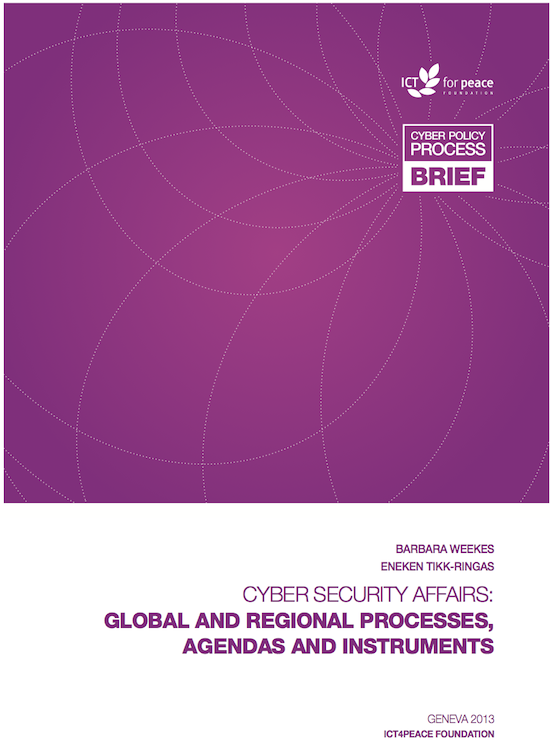An overview of global and regional processes, agendas and instruments by ICT4Peace Foundation
Download the report in full here.
The world is facing a new challenge that is here to stay: an invasive, multi-pronged and multi-layered threat, a modern day arms race without visible weapons or actors, characterized by an escalating number of attacks both on and off the radar. The stability of our networked global system and the proper functioning of our countries, cities and daily activities, rely on the Internet. Critical infrastructure – including transport, transport security, nuclear power plants, electricity, communication networks, oil pipelines, and financial institutions – has become a clear target for cyber attacks, which could have devastating consequences for humankind.
The Internet is a global common good, which has triggered an explosion of innovation, entrepreneurial spirit, communication, business activity, economic growth, social networking, and exchange of ideas. Tackling a threat to this mainstay of modern society requires a global effort, a concerted open dialogue to find common ground and solutions.
While these activities have been taking place for many years behind the scenes, the recent increased number and frequency of media reports, citizens are becoming increasingly aware of this new threat to their wellbeing and are looking towards their governments, civil society leaders and business to engage at the national and global level to find solutions and international agreements to mitigate this threat.
Building on the World Summit on the Information Society (WSIS) and keeping in mind the United Nations Millennium Declaration on peace, security and disarmament, Nation states need to push the international cyber agenda ahead, placing a priority on cyber diplomacy both at a multilateral and bilateral levels. The cloak and dagger erosion of trust currently taking place within countries and between countries at the highest level needs to be stopped through increased transparency and trust building. Cyber-cooperation and cyber diplomacy should become the norm.
The ICT4Peace Foundation has since 2011 called for serious and urgent global negotiations by Governments on norms of state behavior in the cyberspace, and on how to include civil society and business in this regard (http://bit.ly/VC1NqP).
There are encouraging signs that States are finally engaging (e.g at the UNGGE, OSCE, ARF), but more robust and output oriented negotiations are needed. Admittedly this is a new area for diplomats and the relevant stake-holders. It is for that reason that the ICT4Peace Foundation has decided to publish this map of global and regional Processes, Agendas and Instruments that are addressing the issue of cyber security. We wish to thank the Swiss Ministry of Foreign Affairs for their support to the writing of this report.
Daniel Stauffacher
President
ICT4Peace Foundation
###
More output by ICT4Peace Foundation on cybersecurity
- ICT4Peace Foundation calls for an International Code of Conduct on Cyber-Conflict (2011)
- Getting down to business: Realistic goals for the promotion of peace in cyber-space (2011)
- Op-ed in Neue Zürcher Zeitung (NZZ): Disarmament Negotiations for the Cyberspace are needed (2012)
- Reconciling Westphalia and Cyberspace: ICT and Security Developments Between 1969 and 2012
- ICT4Peace brief on upcoming Government Expert consultations on Cybersecurity (GGE) at the UN in New York (2012)
- ICT4Peace: Sustainable and resilient Internet a prerequisite to protect human dignity and save lives in crisis (2012)
- Op Ed Neue Zürcher Zeitung 13 December 2012 | A ticking time bomb: the importance of moving the international cybersecurity agenda forward. Download in the original German, and in English.

